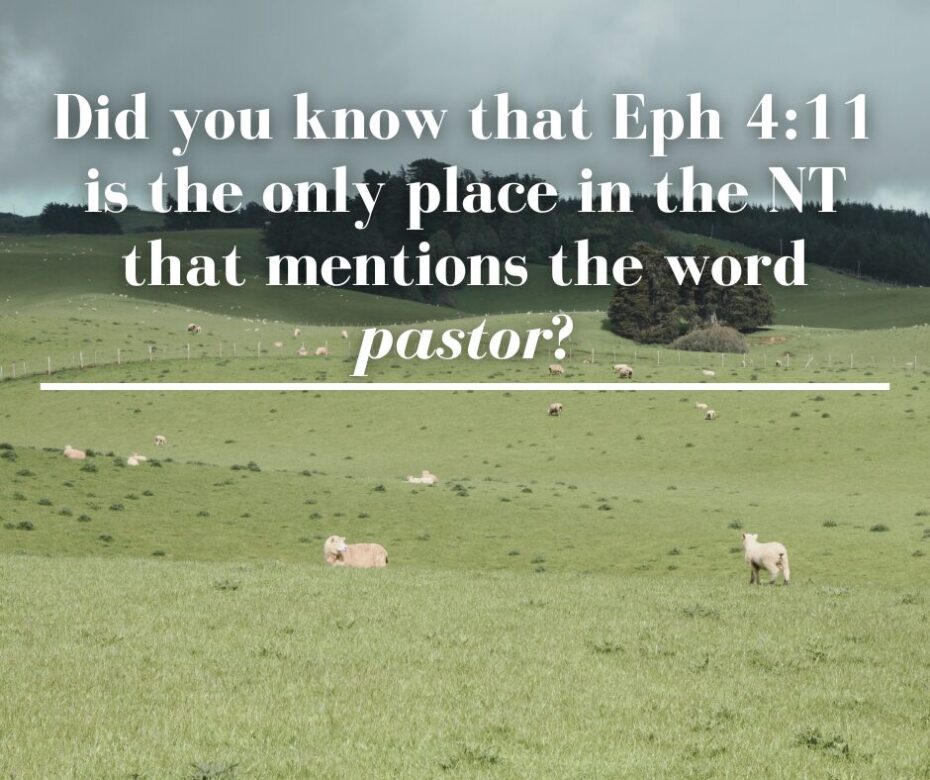I heard a good sermon on unity this past Sunday. At one point, the message touched on Eph 4:11, which says, “And He Himself gave some to be apostles, some prophets, some evangelists, and some pastors and teachers.”
Have you ever wondered what Paul meant by pastors and teachers?
Did you know that Eph 4:11 is the only place in the NT that mentions the word pastor?i
Did you know that in Greek only one article covers both pastors and teachers (tous de poimenas kai didaskalous)?
Notice that Paul speaks of four types of ministry, not five: 1) apostles, 2) prophets, 3) evangelists, and 4) pastor-teachers. The first three are spiritual gifts. So is teaching. Why is the word pastor included with a group of spiritual gifts?
After referring to the fact that only one article governs both nouns, Hoehner comments, “More likely, [pastors and teachers] refer to two characteristics of the same person who is pastoring believers (by comforting and guiding) while at the same time instructing them in God’s ways (overseers or elders are to be able to teach; 1 Tim. 3:2; Titus 1:9)” (“Ephesians” in BKC, p. 635, emphasis added).
Some commentators suggest we should hyphenate that third element: pastor-teacher.
In The Grace New Testament Commentary, J. B. Bond comments: “This is actually one gift, pastor-teacher. The person with this gift may be the shepherd and teacher in a local body. The idea of pastor emphasizes the role of feeding and protecting the flock” (p. 878, emphasis added).
F.F. Bruce comments, “It is appropriate, therefore, that the two terms, “pastors and teachers,” should be joined together to denote one order of ministry” (Colossians, Philemon, and Ephesians, p. 348).
There is no office called pastor in the NT. The office of church leader is called by three synonymous titles in the NT: elder (1 Tim 5:17, 19; Titus 1:5), bishop (1 Tim 3:1, 2; Titus 1:7), and overseer (Acts 20:28; 1 Pet 5:2).
It is not contrary to Scripture for a local church to have an office called pastor. But those who hold the office are what the NT calls elders who specialize in teaching the Scriptures and sound doctrine: “Let the elders who rule well be counted worthy of double honor, especially those who labor in the word and doctrine” (1 Tim 5:17).ii
So, what is the difference between a pastor and a teacher? In the only place in the NT where these words occur together, they refer to one person whom we might call a pastor-teacher. Pastoring is the ability to encourage, exhort, and guide a flock. Teaching is the ability to instruct the flock in the Word and sound doctrine. The two skills are connected in one person. Elders both shepherd and teach the flock.
__________
i Pastor is poimēn in Greek. The cognate verb, poimainō, occurs in Acts 20:28 and 1 Pet 5:2 about shepherding or pastoring the flock. In each case, elders/overseers are being addressed and the people of churches are called the flock in (Acts 20:28-29; 1 Pet 5:2-3). See also John 21:16, where the Lord told Peter to “Tend My sheep.” Pastoring or shepherding the people in a church is a Biblical concept, though it is not an office.
ii All elders had to be able to teach (1 Tim 3:2; Titus 1:9; cf. 2 Tim 2:2). However, not all elders labored in the role of teacher (cf. Jas 3:1).


